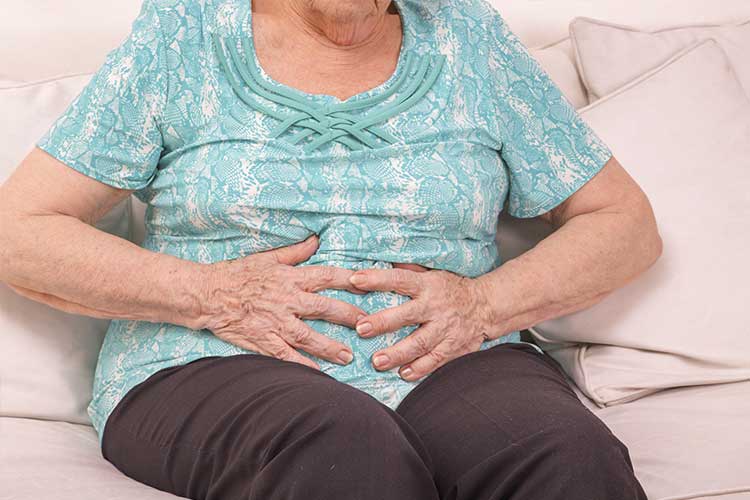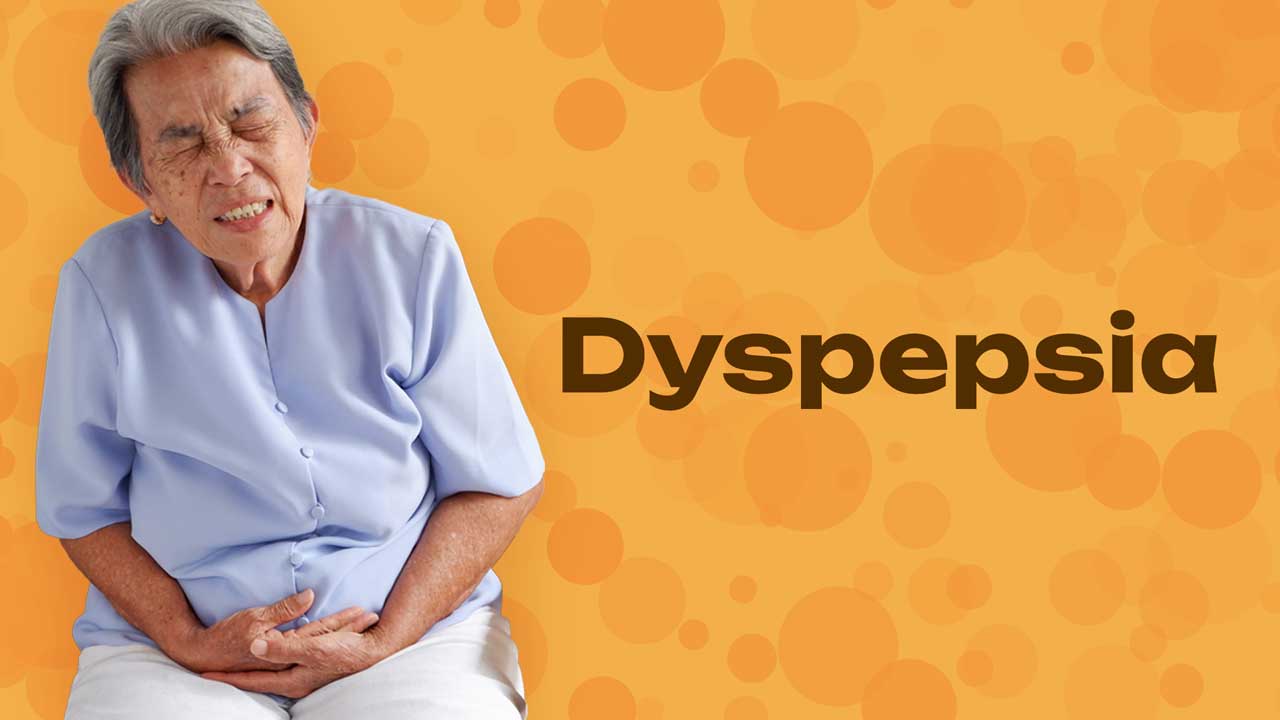What is Dyspepsia?
Dyspepsia (indigestion) is a common symptom characterised by discomfort or pain in the upper abdomen. It typically occurs after eating or drinking (NHS Inform 2023).
Dyspepsia may be associated with other symptoms such as:
- Early satiation (only being able to eat a small amount of food before feeling full)
- Uncomfortable fullness after eating
- Abdominal bloating
- Nausea and vomiting
- Belching or flatulence
- Heartburn
- Regurgitation of food or fluid into the oesophagus.
(Mayo Clinic 2024; NHS Inform 2023)
Dyspepsia is usually mild (NHS Inform 2023), and most people experience occasional episodes (Vincent 2023). However, about 10% of the Australian population experiences chronic dyspepsia with no obvious cause (a condition known as functional dyspepsia) (Talley et al. 2017; Mayo Clinic 2024).
Causes of Dyspepsia

In some cases, dyspepsia may be caused by stomach acid coming into contact with and damaging the digestive mucosa (lining), which can lead to painful inflammation and irritation (NHS Inform 2023).
However, many people who experience dyspepsia don’t have inflammation. Instead, the mucosa may be more sensitive to acidity or stretching caused by eating (NHS Inform 2023).
Dyspepsia may be brought on by:
- Overeating
- Eating too quickly
- Constipation
- Eating fatty, greasy, spicy or acidic foods
- Excessive consumption of caffeine, alcohol, chocolate or carbonated drinks
- Smoking
- Certain medicines (e.g. nitrates, non-steroidal anti-inflammatory medicines, some antibiotics, GLP-1 receptor agonists)
- Obesity, which increases pressure in the stomach
- Stress or anxiety
- Pregnancy
- Irritable bowel syndrome
- Gastritis
- Gastroparesis
- Pancreatitis
- Coeliac disease
- Lactose intolerance
- Gallstones
- Hiatus hernia
- Helicobacter pylori bacterial infection
- Gastro-oesophageal reflux disease (GORD)
- Gastric or duodenal ulcer
- Stomach cancer, which damages the protective lining of the stomach and allows acid to come into contact with the stomach wall
- Intestinal obstruction
- Intestinal ischaemia.
(Mayo Clinic 2024; NHS Inform 2023; NIDDK 2025)
Dyspepsia in Older People
Dyspepsia is common in older people for several reasons, including:
- Reduced blood flow with age, which causes hypoxia and weakening of the mucosal defences
- Reduced effectiveness of digestion due to age-related changes (e.g. reduced saliva, gastric juice, bile and enzyme production)
- The ageing stomach being more vulnerable to disease overall
- The prevalence of older people who are prescribed NSAIDs and aspirin
- Increased risk of Helicobacter pylori infection in older people
- Inadequate chewing of food due to poorly-fitting dentures, dental decay or tooth loss
- Reduced gut movement due to a more sedentary lifestyle.
(Walker & Talley 2019; Elderly Health Service 2025)
Complications of Dyspepsia
Dyspepsia generally has no long-term serious effects. That being said, it can be distressing and significantly impair quality of life, especially if it’s chronic (Talley et al. 2017).
People who experience dyspepsia may:
- Feel uncomfortable
- Eat less
- Miss work or school
- Have other symptoms from an underlying cause of dyspepsia.
(Mayo Clinic 2024)
Investigating and Managing Dyspepsia in Older Adults
History Taking
A detailed history of the patient should be taken in order to determine if there is an underlying cause of the dyspepsia.
This may involve:
- Determining whether there is a dominant history of heartburn or regurgitation, which may indicate gastroesophageal reflux disease (GERD)
- Undertaking a medicine review to identify any medicines that may be causing symptoms, such as:
- NSAIDs
- Corticosteroids
- Opioids, including codeine-based analgesia
- Calcium channel antagonists
- Nitrates
- Theophyllines
- Bisphosphonates.
- Identifying any symptoms indicative of malignancy, such as weight loss, anorexia, vomiting, dysphagia, odynophagia or a family history of gastrointestinal cancers
- Determining whether the patient is experiencing severe episodic pain in the epigastric or right upper abdominal regions, which may indicate symptomatic cholelithiasis
- Determining whether the patient is experiencing nausea and vomiting (with or without weight loss), which may indicate gastroparesis
- Identifying whether the patient has any of the following risk factors:
- Family history of oesophagogastric cancer (in over two first-degree relatives)
- Family history of familial adenomatous polyposis in any first-degree relative
- Barrett's oesophagus
- Pernicious anaemia
- Underwent gastric surgery over 20 years ago
- Known dysplasia, atrophic gastritis or intestinal metaplasia.
(Longstreth & Lacy 2025; RefHelp 2024)
Patient Assessment
The only abnormal finding upon physical examination should be epigastric tenderness.
Other findings may suggest a diagnosis other than dyspepsia, for example:
- Palpable abdominal mass
- Lymphadenopathy
- Jaundice
- Pallor (secondary to anaemia)
- Ascites
- Muscle wasting, loss of subcutaneous fat and peripheral edema caused by weight loss (may indicate malignancy).
(Longstreth & Lacy 2025)

Red Flags
Certain symptoms may require an escalation of care involving prompt medical intervention. Adhere to your organisation’s policy and procedures and perform basic life support if necessary. These symptoms include:
- Black, tar-like stools
- Blood in vomit
- Dysphagia
- Excessive vomiting
- Unplanned weight loss
- Chest, jaw, neck or arm pain
- Severe, persistent abdominal pain
- Shortness of breath
- Sweating
- Jaundice.
(NIDDK 2025)
Laboratory Tests
In order to identify red flags or underlying metabolic illness, the following routine blood counts and blood chemistry tests should be performed:
- Liver function tests
- Serum electrolytes, glucose, creatinine, calcium, lipase and amylase.
(Longstreth & Lacy 2025)
Test for Helicobacter pylori
Patients over 60 should undergo an endoscopy and biopsy of the stomach in order to test for Helicobacter pylori infection. If H. pylori is present, the patient can undergo eradication therapy (Longstreth & Lacy 2025).
(Longstreth & Lacy 2019)
Endoscopy for Diagnostic Testing
- Refer the patient for an endoscopy if they have any of the following symptoms:
- Dysphagia
- Odynophagia (pain when swallowing)
- Escalate care and facilitate urgent endoscopy when red flags are evident:
- Dysphagia
- Unplanned weight loss
- Iron deficiency or nutritional anaemia
- Anorexia
- Early satiety
- Family or personal history of cancer in the digestive system
- Onset of peptic ulcer disease within the previous 12 months
- Abnormal blood test or imaging results.
(SCV 2021; RefHelp 2024)
Treatment
Depending on the underlying cause of the dyspepsia, if any, the patient may require treatment, including:
- Antacids (best taken when expecting symptoms, e.g. after eating or before sleeping)
- Proton pump inhibitors (PPIs) to reduce stomach acid
- H-2-receptor antagonists (H2RAs) to reduce stomach acid
- Prokinetics to increase gastrointestinal movement
- Antibiotics to treat Helicobacter pylori infection
- Antidepressants or anti-anxiety medicine to decrease neuropathic pain
- Antisecretory therapy.
(NHS Inform 2023; Mayo Clinic 2024; Longstreth & Lacy 2025)
Note that any medicines should be taken as directed by a prescribing clinician or other appropriately trained professional.
Preventing Dyspepsia in Older Adults

Mild dyspepsia may be prevented or relieved through strategies such as:
- Regular exercise
- Smoking cessation
- Avoiding alcohol
- Eating smaller, more frequent meals to prevent the digestive system from being overloaded
- Eating more slowly
- Chewing more thoroughly
- Eating softer foods (e.g. soup, fish, ground meat, peeled fruit, braised food)
- Cutting food into small pieces before eating
- Avoiding eating within three to four hours before sleeping
- When sleeping, propping the head and shoulders up using pillows or raising the bed head by placing something underneath the mattress
- Avoiding drinking large amounts of liquid while eating to reduce the feeling of fullness
- Avoiding fried and fatty foods
- Avoiding caffeine
- Wearing loose-fitting garments
- Avoiding eating until full
- Avoiding lying down immediately after eating
- Managing stress and anxiety
- Reviewing medicines.
(Elderly Health Service 2025; NHS Inform 2023)
Test Your Knowledge
Question 1 of 3
How many Australians experience functional dyspepsia?
Topics
Further your knowledge
References
- Elderly Health Service 2025, Dyspepsia, Department of Health, The Government of the Hong Kong Special Administrative Region, viewed 30 May 2025, https://www.elderly.gov.hk/english/health_information/digestive_problems/dyspepsia.html
- Longstreth, GF & Lacy, BE 2025, Approach to the Adult With Dyspepsia, UpToDate, viewed 30 May 2025, https://www.uptodate.com/contents/approach-to-the-adult-with-dyspepsia
- Mayo Clinic 2024, Indigestion, Mayo Clinic, viewed 30 May 2025, https://www.mayoclinic.org/diseases-conditions/indigestion/symptoms-causes/syc-20352211
- National Institute of Diabetes and Digestive and Kidney Diseases 2025, Symptoms & Causes of Indigestion, National Institutes of Health, viewed 30 May 2025, https://www.niddk.nih.gov/health-information/digestive-diseases/indigestion-dyspepsia/symptoms-causes
- NHS Inform 2023, Indigestion, NHS Scotland, viewed 30 May 2025, https://www.nhsinform.scot/illnesses-and-conditions/stomach-liver-and-gastrointestinal-tract/indigestion
- RefHelp 2024, Dyspepsia, NHS Lothian, viewed 30 May 2025, https://apps.nhslothian.scot/refhelp/Gastrointestinal/Dyspepsia
- Safer Care Victoria 2021, Gastroscopy for Dyspepsia Without Red Flag Symptoms, Victoria State Government, viewed 2 June 2025, https://www.safercare.vic.gov.au/best-practice-improvement/clinical-guidance/non-urgent-elective-surgery/gastroscopy-for-dyspepsia-without-red-flag-symptoms
- Talley, NJ, Goodsall, T & Potter, M 2017, ‘Functional Dyspepsia’, Australian Prescriber, vol. 40, no. 6, viewed 30 May 2025, https://www.nps.org.au/australian-prescriber/articles/functional-dyspepsia
- Vincent, P 2023, Indigestion, Patient, viewed 30 May 2025, https://patient.info/digestive-health/dyspepsia-indigestion
- Walker, MM & Talley, NJ 2019, ‘Functional Dyspepsia in the Elderly’, Current Gastroenterology Reports, vol. 21, no. 54, viewed 30 May 2025, https://link.springer.com/article/10.1007/s11894-019-0722-5
 New
New 

